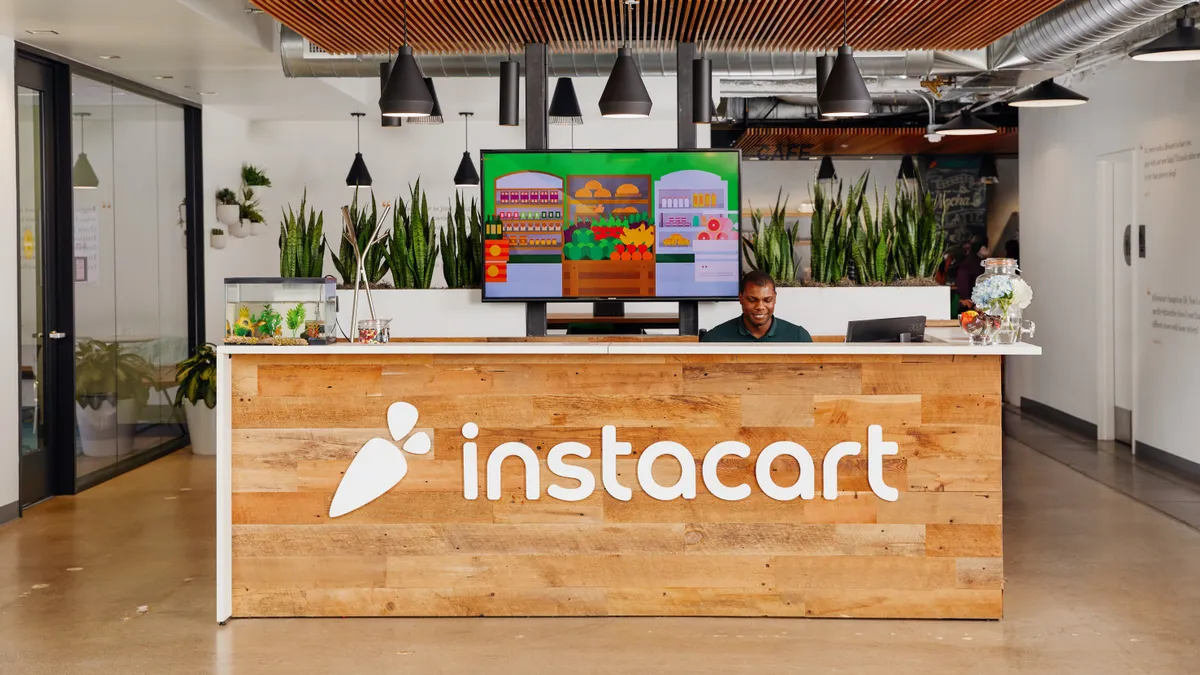Dive Brief:
- Instacart has raised $265 million in new funding, more than doubling its valuation to $39 billion, the company announced Tuesday morning.
- The funding round was led by a group of investors that already have put money into the company, including Andreessen Horowitz, Sequoia Capital, D1 Capital Partners, Fidelity Management & Research Company and T. Rowe Price Associates.
- Instacart's valuation has surged during the pandemic as the company, buoyed by strong consumer demand for grocery pickup and delivery services, builds momentum ahead of a widely expected debut on the stock market.
Dive Insight:
Instacart said in the announcement it plans to use the new funds to boost its corporate staff by half in 2021, invest in efforts to enhance its marketplace, facilitate advertising by CPG companies and develop e-commerce technology for retailers.
Over the past few months, Instacart has welcomed a flurry of new financing that has dramatically increased its valuation. The company announced in June that it raised $225 million at a $13.7 billion valuation, and in October, it bagged another $200 million, which raised its valuation to $17.7 billion.
Instacart has dominated the grocery e-commerce market as the coronavirus pandemic prompted grocers that didn't offer e-commerce or hadn't fully developed the capabilities to partner with the e-commerce platform to reach shoppers.
"For many [retailers], Instacart has been the ideal partner as the platform provides a solution that can be implemented quickly and without vast amounts of capital expenditure," Neil Saunders, managing director of GlobalData, wrote in emailed comments. "This is why it is 'hot property' and has such a heady valuation," Saunders added.
Instacart's growing client base, large shopper base and wide geographic reach give it distinct advantages to attracting grocery and non-food retail partners, Saunders wrote. Long-term, Saunders forecasts that Instacart will turn away from in-store picking for a more direct fulfillment model or work directly with consumer brands, posing a threat to some of its current retail partners.
In addition to its focus on funding, Instacart also recently embarked on an executive hiring spree, bringing on a new chief financial officer, chief operating officer, chief human resource officer and vice president of finance during the past few months. The new executives hail from tech companies like Facebook, LinkedIn and YouTube, bringing more expertise in digital experiences to Instacart.
Instacart also has its sights set beyond the grocery industry, linking up with companies like Sephora, Walgreens and Best Buy.
According to a newly released report from 1010data, Instacart "drove significant adoption" of online grocery shopping and delivery last year, with the company consistently having a higher percentage of online grocery spending than other delivery services and e-grocers since 2019. In April of 2020, Instacart had more than 15% of the share of online grocery spending compared to its competitors, which had less than 10%.
Instacart pushed past Walmart in the first half of 2020 to snag the No. 1 spot in market share for total online grocery sales of the companies 1010 data analyzed, noting that Instacart grew 323% year-over-year and now, at 28%, holds the majority of market share online.


















